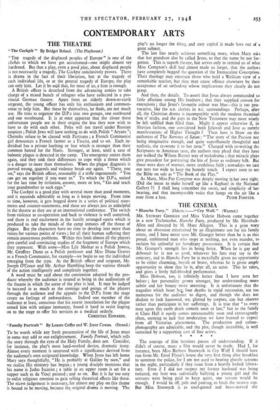" Family Portrait " By Lenore Coffee and W. Joyce
Cowan. (Strand.)
To be worth while any fresh presentation of the life of Jesus. must in some way add to our enlightenment. Family Portrait, which tells the story through the eyes of the Holy Family, does not. Consider, for instance, the play's most hard-worked device, dramatic irony. Almost every moment is saturated with a significance derived from the audience's own scriptural knowledge. When Jesus has left home Mary says thoughtfully, " He is probably at Galilee by now," and we realise. His ministry has begun ; a young disciple mentions that his name is Judas Iscariot ; a table in an upper room is set for a supper such as da Vinci painted ; and so on. But it is far too easy to enlist religious emotion to gain telling theatrical effects like these. The nicest judgement is necessary, for almost any play on this theme is bound to be moving, because the original drama is moving. The
play's no longer the thing, and easy capital is made here out of a great subject.
The last line nearly achieves something more, when Mary asks that her grandson also be called Jesus, so that the name be not for- gotten. This is superb theatre, but serves only to remind us of what Miss Compton's skill had almost made us forget, that the authors have completely begged the question of the Immaculate Conception. Their theology may entertain those who hold a Wellsian view of a remarkable teacher, but they may cause offence elsewhere by their acceptance of an orthodoxy whose implications they clearly do not grasp.
And then, the details. To assert that Jesus always commanded so little affection among His brothers ; that they supplied crosses for executions ; that Jesus's favourite colour was blue—this is too pro- vocative, like the A.D. clothes in B.C. surroundings. Perhaps, after all, the Christian drama is incompatible with the modern theatrical box tricks, and the gaps in the New Testament may more wisely be left unfilled than filled thus. Might it appear otherwise if, in Shavian fashion, one considered both Jehovah and Jove as merely manifestations of Higher Thought ? Then here is Shaw on the authoress of The Sorrows of Satan : "The story of the Passion not being imaginative enough, and quite superfluously thoughtful and realistic, she re-wrote it to her taste." Charged with re-writing the Scriptures to American taste, the authors may plead that they have not walked the Wilson Barrett way of melodrama ; that miracle plays give precedent for portraying the kin of Jesus as ordinary folk. But those were days of warmer, more credulous faith ; nowadays we cast our nets too wide to keep the homely touch. I expect soon to see the Bible on sale as " The Book of the Play."
As Mary, Miss Fay Compton was deeply moving in her own right. (Did she mean to make herself up like a Raphael in the National Gallery ?) I shall long remember the sweet, sad simplicity of her bearing, and that incomparable voice that hangs on the air like a


































 Previous page
Previous page